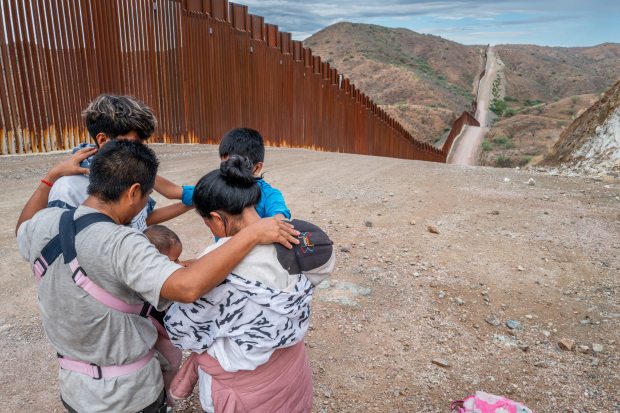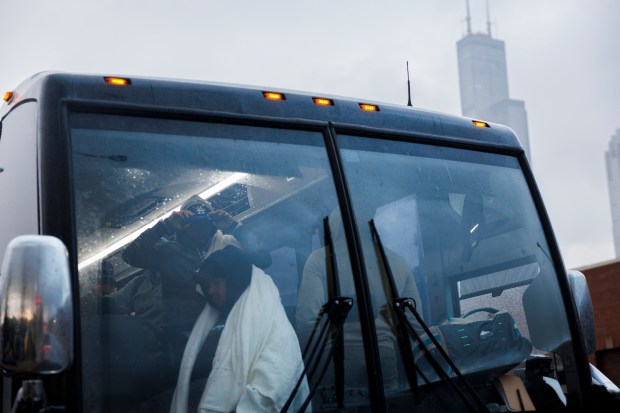More than 44,000 migrants have been sent to Chicago by bus or plane over the last two years and the city’s struggle to keep them housed, fed and safe has stretched resources and sparked fierce debate over how scarce tax dollars are spent.
But the largely man-made influx where asylum-seekers have been sent from Texas to cities like Chicago is likely “only going to be the beginning,” of migrant movements as climate concerns continue to escalate, Ald. Andre Vasquez, 40th, predicted Tuesday.
Aldermen on Tuesday weighed the prospect of future climate change-related disasters pushing people to the city during a City Council Immigration Committee hearing. Providing both warnings and recommendations, migration experts argued the arrival of future migrant influxes is only a question of when.
Cities such as Chicago with access to bodies of fresh water are set to fare better with climate change and as a result will see migration increases, said Vasquez, the committee’s chair.
“As we’ve experienced, governments are not prepared to address huge influxes of migration,” he said. “But this is the direction things are going in, whether a city is prepared or not.”
Chicago’s current migrant housing challenges began when Republican Gov. Greg Abbott of Texas began to send mostly Venezuelan migrants by bus to the city in August 2022. The city has since spent about $400 million caring for the newcomers.
That caretaking effort has seen relative calm in recent weeks as the number of new arrivals and people living in city- and state-run shelters has steadily declined. There are 5,950 people living in the shelters, down from around 15,000 at the beginning of the year.
Climate change has already brought migrants and other newcomers to Chicago, including disasters such as Hurricane Katrina in 2005 and Hurricane Maria in 2017, said Dulce Guzmán, deputy director of institutional development at migrant coalition group Alianza Américas.
Those who arrive in Chicago often need housing or work and have to do so practically from scratch after having lost everything from their support structure to their cars. But governments struggle to quickly connect them with the resources they need, Guzmán said. They might come after a single major disaster or from “decadeslong, steady movements,” she added.
“As the effects of climate change worsen, no communities sending or receiving will be immune from climate threat,” Guzmán said.
The experts implored aldermen to build migrant support systems that will be ready for future influxes and to partner with climate-vulnerable Latin American and Caribbean countries to help them better handle future crises themselves.
Vasquez argued the city needs to combine its shelter systems for both people who are experiencing homelessness and for migrants to prepare for what is ahead. It’s an idea homelessness advocates have long championed and one Mayor Brandon Johnson’s administration has announced his administration is working toward.
“Unless we see some worldwide change in our behavior, this seems like it’s only going to go in one direction,” he said, noting services are lacking for migrants and those experiencing homelessness. “Whether you’re a migrant that just got here or have been here for decades and were born here, the services and resources are not adequate.”

The committee also discussed another crisis in South America that could spark more migration to the United States and Chicago. Amid instability and violence in Ecuador, the federal government should grant Ecuadorians coming to the U.S. temporary protected status, a designation that allows refugees to pursue work in the U.S. once approved.
The request was backed by Ecuadorian community organizations and the country’s local consul general.
“Just as with the Ecuadorian community, there are many people throughout Latin America that are fleeing violence, that are fleeing global change and oftentimes our foreign policies,” said Ald. Byron Sigcho-Lopez, 25th, who was raised in Ecuador.
Aldermen also called on the Chicago Police Department to better process visas for immigrants who are victims of crime. The department needs to explain why it struggles to process the so-called “U” visas that help victims come forward to address crime even when they do not have legal status, sponsor Ald. Raymond Lopez, 15th, said.



